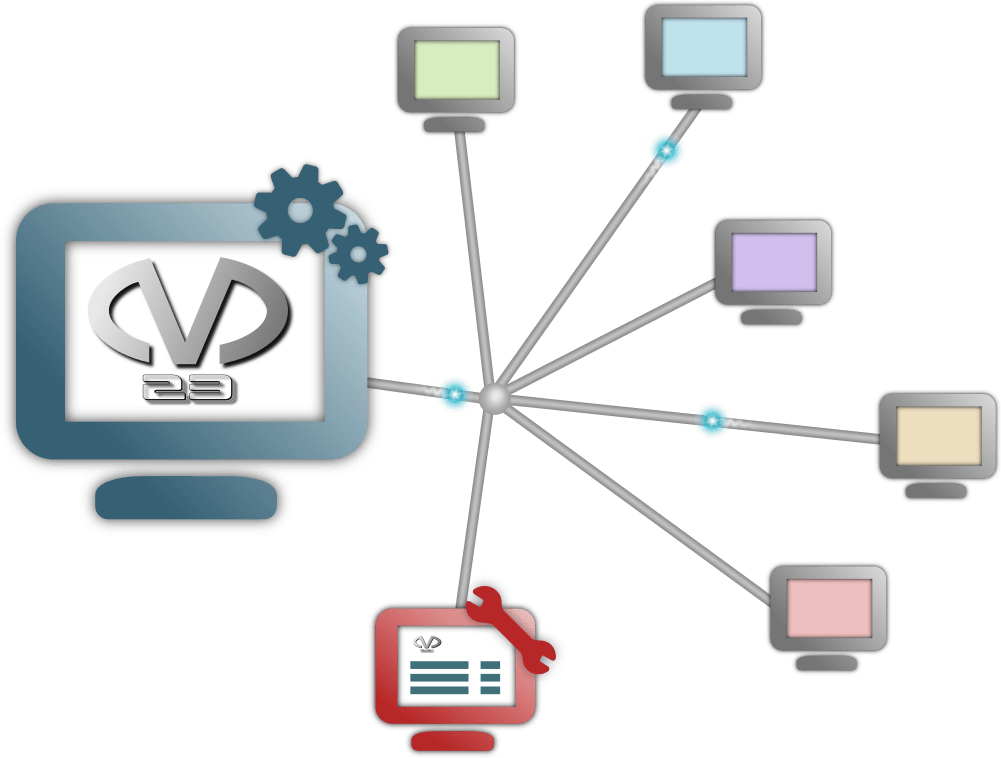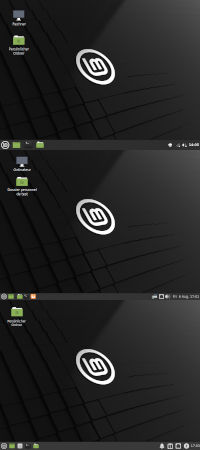
Network Deployment for Linux
Nur einen Moment... / Just a moment...
Freie Software und Bürgerrechte benötigen Deine Aufmerksamkeit!
Handeln gegen Überwachungsstaat und Softwarepatente
Wenn Du auch in Zukunft in einem Staat leben möchtest, der nicht dem Überwachungsstaat aus "1984" gleicht, und/oder Du möchtest, dass weiterhin jede(r) Software entwickeln und vertreiben kann, gibt es verschiedene Möglichkeiten, sich zu engagieren. wir möchten Dir diese fünf Organisationen empfehlen:
Free software and civil rights need your help!
Act against police state and software patents
If you don't want to live in a state à la "1984" and you want that development and distribution of software should remain legal for everyone, then you have different possibilities to get into the act. We would like to recommend these five organisations:

m23 21.1 now supports the recently released Debian 11 Bullseye to be used as client platform (including 6 preconfigured desktop environments) as well asLinux Mint 20.2 Uma, which comes with 3 preconfigured desktop environments. In addition to these quite obvious changes, many changes and improvements "under the hood" made it into the new version: e.g. the option to connect a FreeIPA server to an m23 server, to make use of some FreeIPA functionality (e.g. user authentication, Kerberos, roles or user group comparison).
Debian 11 Bullseye
m23 clients with Debian 11 bring you many updated software packages and also the familiar range of installable desktop environments: Mate (optionally as minimal variant with only the absolutely necessary packages), Cinnamon, Gnome, KDE, LXDE and Xfce. 64- and 32-bit clients can be installed, with the desktop selection being independent of the system architecture.
Linux Mint 20.2 Uma
Linux Mint 20.2 Uma has been added as a client distribution, which includes the familiar range of functions from the other distributions. It comes with three preconfigured desktop environments: Mate, Cinnamon and Xfce.
FreeIPA
In addition to the added support for the new distros, the most notable change is the option to use FreeIPA in conjunction with m23. A new dialog allows you to setup your m23 server for connecting it to a FreeIPA server werden. If FreeIPA is used for an m23 client, it will be connected to FreeIPA, allowing you to use some FreeIPA functions, including user authentification, Kerberos, roles or comparison of user groups). The m23 server can then also access the data stored on the FreeIPA server, in order to add entries for users, groups, devices (hosts) and DNS configuration and to read information from it, e.g. the IP addresses used in FreeIPA. On deletion of an m23 client, the corresponding entries will be removed from from the FreeIPA server.
Reuse of a customer project
In the course of working on a customer project for a group of schools, many customized functionalities emerged that are only used within the context of this project, or which have even been discarded and superseded by new ideas and decisions. These functions are still available in the m23 API and?thanks to the open source nature of m23?can be used in future m23 versions. It is also possible to reuse them outside of a school context, e.g. in your enterprise or organization). Among those new options are the integration von FusionDirectory, the automated creation of organizational structures in LDAP, the usage of Kerberos without FreeIPA or a client add wizard dialog, where all the necessary information (e.g. user account, Linux kernel, distribution, desktop) can be entered on a single page. The m23 client would then use this information to do a full installation (with automated partioning and formatting) without any further user interaction.

m23 autoTest
m23 autoTest, the framework for automated testing of m23 functions, has been improved in many places (e.g. the text recognition that is used to check the screen content of virtual m23 test clients) and is now compatible with VirtualBox 6.x. During refactoring, compatibility code for the old VirtualBox versions 2 and 3 has been removed and the XML test case files have been adjusted accordingly.
Further changes and small updates
- Support for a few outdated distributions (Ubuntu 16.04, LinuxMint 18 and 18.1, Ubuntu < 14.04 and Debian 6.0) has been removed from the m23 code.
- The CloudStack icon has been hidden in the server settings dialog. The corresponding m23 functions are still there, so they could be used when reactivating the CloudStack integration.
- m23 now uses the DNS server of OpenNIC as a preset in the m23 server installation ISO file, and also suggests to use it for m23 clients, when it cannot find any primary DNS server.
- All users logged in on an m23 client are now able to shut down the machine all members of the group "m23sudo" have permission to execute programs with root privileges via sudo.
- The Raspberry Pi SD card image now uses Raspberry Pi OS as of May 7th, 2021, making it compatible to the Raspberry Pi 400.
-
PHP debugging can be activated by running
/m23/bin/phpDebug, so error messages and warnings will be displayed in your webbrowser.
Bug fixes and code improvements
Of course, a couple bug fixes needed to be made, too. The cron job that deletes old package source index files is now removed upon uninstalling the m23 package. Multiple return values in m23 functions have been corrected and missing dependencies were included.
m23 app for the Univention Corporate Server
The m23 app for UCS 5.0 will be released shortly (or maybe already is released now that this news article is published). Support for UCS 4.4 has been dropped from the m23 version.
Downloads / Update
The latest release is available as an update from the m23 interface, via apt (configuration as described in the Installation Guide), as an app for UCS, as ISO file for the creation of an m23 server installation medium, as a preinstalled virtual machine and as an image file for Raspberry Pi (the latter three can be found in the Download section).





